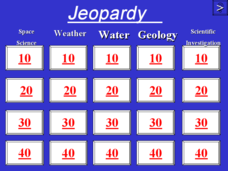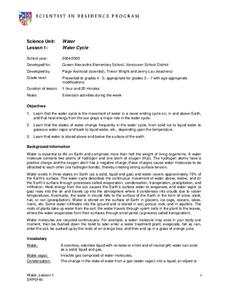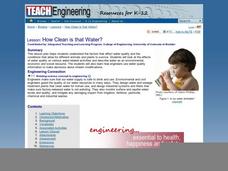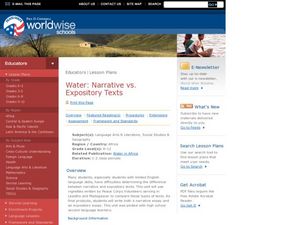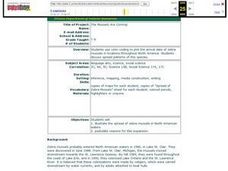Curated OER
Where in the world is the Hydra Electron?
Walk your class through the journey water takes once it leaves your kitchen sink, all the way through the water cycle. Demonstrations support your lecture. This plan is thoroughly written, but ideally you would follow it up with water...
Curated OER
Watering Our Prairie Farms
After reading an article about irrigation on Canadian farms, learners participate in a discussion. They individually write an opinion paper about the surrounding issues. A lesson plan like this can be used in an earth science class when...
Curated OER
Jeopardy - Earth Sciences
Questions about water, weather, geology, astronomy, and the scientific process make up this Jeopardy game. It is a pretty well-rounded set of slides, although you may want to be aware that a few of the questions are specific to the state...
Curated OER
Investigating Properties of Water: Temperature
Investigate how temperature affects the density of water and stratification that occurs in bodies of water when temperatures vary. Water of differing temperatures is given different colors to see the layers that form. The lesson plan is...
Curated OER
Science Jeopardy
Water, currents, waves, salt marshes, and The Chesapeake Bay make up the categories for this Jeopardy-style game. In terms of functionality, it works well. However, it is unlikely that you focus on the Chesapeake Bay as part of your...
Curated OER
Water Facts: Conservation
How much water does the average person use? Provide an answer to this big question with the help of this slide show presentation. The amount of water used for specific daily tasks is shown alongside several simple conservation tips. Tip:...
Curated OER
Understanding Waves
Learners examine the physical properties of waves to explore the word crest and trough. They use toys to study waves in air, water and light.
Curated OER
Keeping Safe in School
Discuss personal safety at school, near the water, or when there is a fire. This resource provides several scenarios intended to encourage class discussion related to staying safe and making good choices.
Curated OER
Growing Cress: Sprouts
What does it take to grow a healthy plant? Budding horticulturists will look at each slide and consider which conditions produced the best results. Slides contain images of plants that have had too much or too little water, light, or...
Curated OER
Where Does Water Come From?
Perfect for children in pre-K through 1st grade, this presentation provides simplified information about the water cycle. While no academic language is used, the water cycle is fully represented in clear and easy-to-follow slides. This...
Curated OER
How Do We Use Water Everyday
In this water conservation worksheet, young scholars complete a chart telling 4 daily uses of water. They fill in a second chart describing two ways water is wasted, and make a poster persuading others not to waste water.
Curated OER
Water Cycle
Young scientists explore Earth elements by conducting an experiment. They define water vocabulary terms such as condensation and precipitation. In addition, they conduct a water experiment in which they build a terrarium, so they can...
Curated OER
How Clean is the Water?
Students read about and discuss water and how it is used as a resource and how engineers use technology to preserve it. In this water lesson plan, students look at a picture of water treatment and tell what is wrong with the picture.
Curated OER
You Are What You Drink!
Students explore water treatment systems. In this water conservation ecology lesson plan, students identify and explain several processes used for water treatment and define related vocabulary after listening to content information given...
Curated OER
Properties of Water
Biology and chemistry learners alike will benefit from this presentation about the properties of water. It reveals that most of its unique characteristics are due to the hydrogen bonding within the water molecule. Attractive graphics...
Curated OER
Chemistry Comes to Life
Although biochemistry of the human body is a vital topic, it doesn't have a chapter dedicated to it in many biology textbooks. If that's the case with your text, you can use this resource as a guide for designing your own lecture and as...
Curated OER
Boat Safety and Water Sports, Lesson 2: Personal Flotation Devices
Lesson 2 is part of a twenty-two lesson unit on boat safety and water sports. The focus in this lesson is on personal flotation devices. There are reasons why the law requires PFDs. Click on the resource link at the bottom of the page to...
Curated OER
Water: Narrative vs. Expository Texts
A reading of vignettes written by Peace Corps Volunteers serving in Lesotho and Madagascar launches a study of the difference between narrative and expository texts. As final products, young writers craft both a narrative and an...
US Department of Energy
Sunlight and Evaporation
Here is a simple inquiry experiment designed to demonstrate that the energy from sunlight can evaporate water. Young scientists follow provided procedural steps to construct a model of our atmosphere using a bowl, a cup, water and...
Curated OER
Matter: The 3 States of Water
The states of water are the focus of this PowerPoint. The presentation includes definitions of liquids, solids, and vapors. It also includes examples and illustrations of each of the states of water and information about how water can...
Curated OER
The Water Cycle - Main Components
Present the water cycle to your middle schoolers with this lesson. After an anticipatory set, they participate in a Q & A session about the terms associated with the water cycle: evaporation, transpiration, condensation, and...
Curated OER
Rock River Watershed
Students discover what a watershed is and which one they live in. Using the internet, they research why watersheds are important to an ecosystem and how to keep them from getting polluted. They use a map to locate various items within a...
Curated OER
The Mussels Are Coming
Students work together to identify and describe the various types of mussels. Using a color-coded system, they plot the arrival date of zebra mussels in North American waters. They discuss the increase in their population with the class.
Curated OER
Leach Out and Touch Someone
Students discuss how groundwater becomes polluted. In groups, they design and create models of groundwater pollution sources. They demonstrate to the class how the water may become contaminated from local and nonlocal pollution sources.




